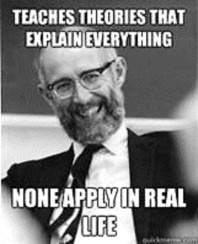Chicago economics — garbage in, gospel out
Lars Syll

“Every dollar of increased government spending must correspond to one less dollar of private spending. Jobs created by stimulus spending are offset by jobs lost from the decline in private spending. We can build roads instead of factories, but fiscal stimulus can’t help us to build more of both. This form of “crowding out” is just accounting, and doesn’t rest on any perceptions or behavioural assumptions.” – John Cochrane
And the tiny little problem? It’s utterly and completely wrong!
What Cochrane is reiterating here is nothing but Say’s law, basically saying that savings are equal to investments and that if the state increases investments, then private investments have to come down (‘crowding out’). As an accounting identity, there is, of course, nothing to say about the law, but as such, it is also totally uninteresting from an economic point of view. As some of my Swedish forerunners — Gunnar Myrdal and Erik Lindahl — stressed more than 80 years ago, it’s really a question of ex-ante and expost adjustments. As further stressed by John Maynard Keynes about the same time, what happens when exante savings and investments differ, is that we basically get output adjustments. GDP changes and so makes saving and investments equal ex-post. And this, nota bene, says nothing at all about the success or failure of fiscal policies!
“Government borrowing is supposed to ‘crowd out’ private investment. The current reality is that on the contrary, the expenditure of the borrowed funds (unlike the expenditure of tax revenues) will generate added disposable income, enhance the demand for the products of private industry, and make private investment more profitable. As long as there are plenty of idle resources lying around, and monetary authorities behave sensibly, (instead of trying to counter the supposedly inflationary effect of the deficit) those with a prospect for profitable investment can be enabled to obtain financing. Under these circumstances, each additional dollar of deficit will in the medium long run induce two or more additional dollars of private investment. The capital created is an increment to someone’s wealth and ipso facto someone’s saving. “Supply creates its own demand” fails as soon as some of the income generated by the supply is saved, but investment does create its own saving, and more. Any crowding out that may occur is the result, not of underlying economic reality, but of inappropriate restrictive reactions on the part of a monetary authority in response to the deficit.” -William Vickrey, Fifteen Fatal Fallacies of Financial Fundamentalism
Chicago economics is a dangerous pseudo-scientific zombie ideology that ultimately relies on the poor having to pay for the mistakes of the rich. Trying to explain business cycles in terms of rational expectations has failed blatantly. Maybe it would be asking too much of freshwater economists like John Cochrane to concede that, but it’s still a fact that ought to be embarrassing.

My rational expectation is that 80 years from now, no one will know who John Cochrane was. John Maynard Keynes, on the other hand, will still be known as one of the masters of economics.
Source: Lars Syll blog,16 Sept 2023 https://larspsyll.wordpress.com/2023/09/16/chicago-economics-garbage-ingospel-out-3/



























